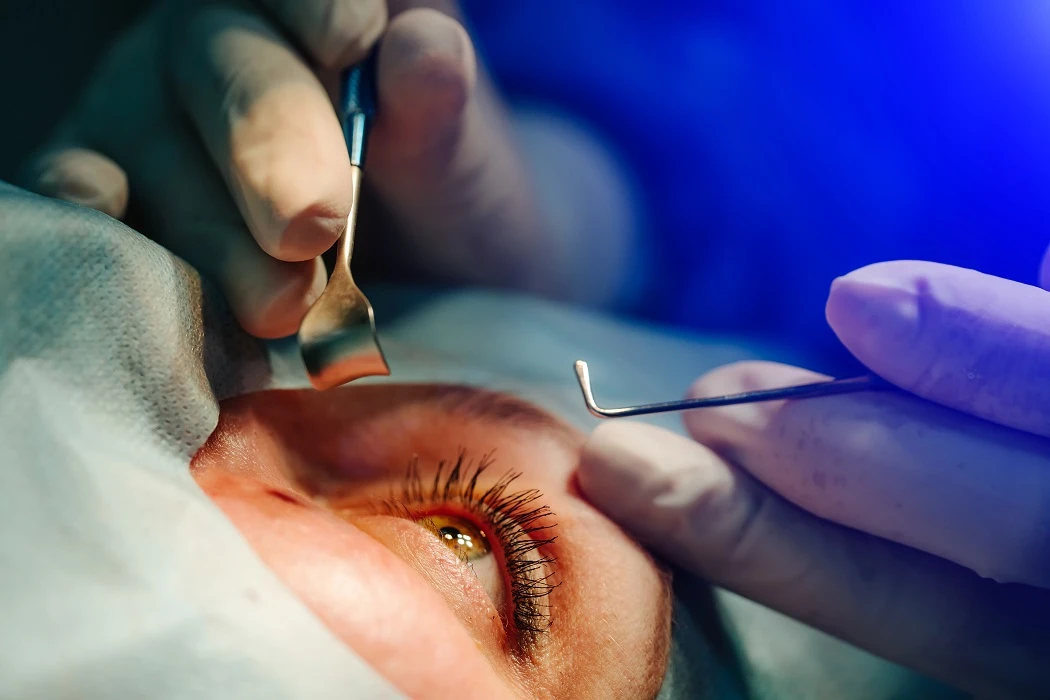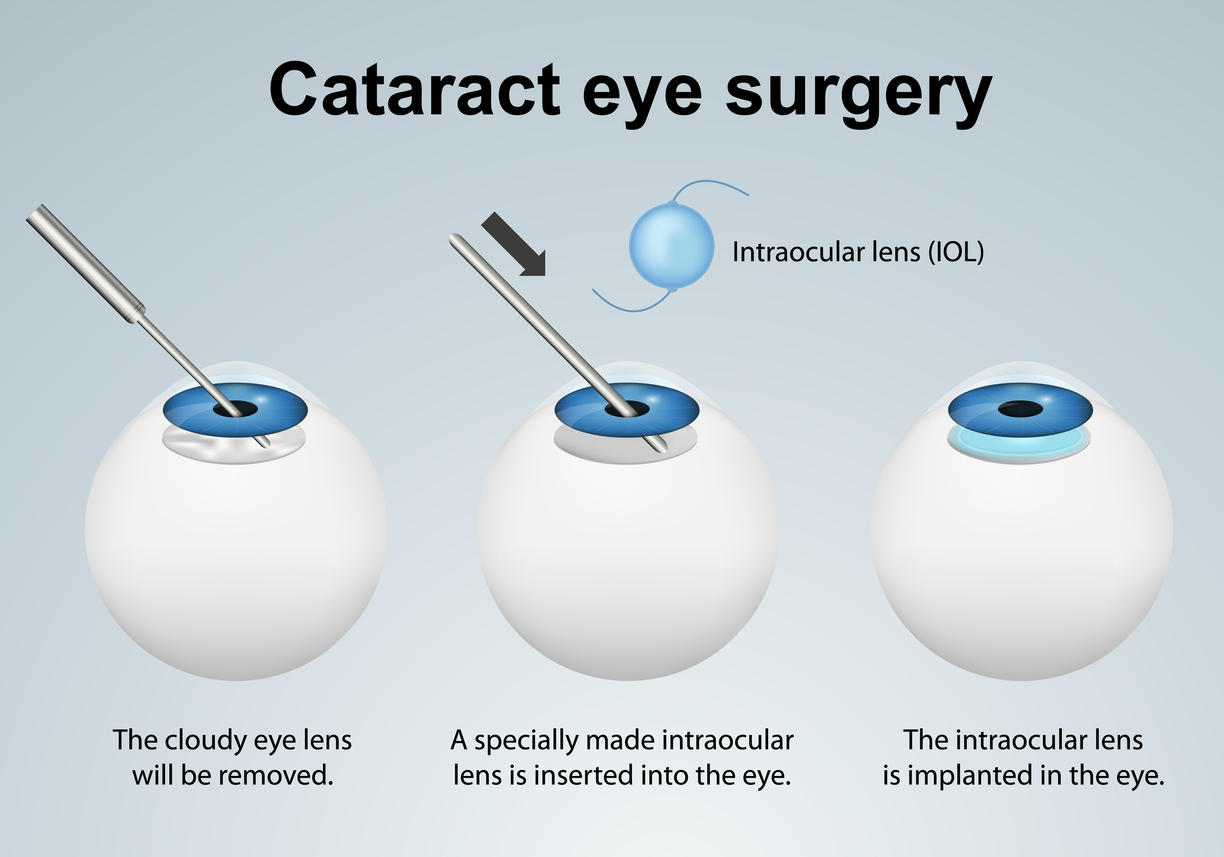Cataract Surgery Recovery Time-various aspects-
Cataract surgery is typically a quick outpatient operation that allows for a relatively swift recovery. While many people begin to notice improvements in their vision within a couple of days, it may take up to a month for full recovery and for vision to fully stabilize. Some individuals might encounter mild discomfort, redness, and increased sensitivity to light during the initial days, but these effects usually subside within a week.


Recovery Timeline Overview:
- First 24-48 hours: Vision might appear blurry or out of focus, but some improvement can usually be seen within a few hours.
- Days 1-2: Many individuals can engage in light tasks, like watching television or reading, and may even be cleared to drive based on the surgeon’s advice.
- Week 1: Discomfort, redness, and light sensitivity should begin to lessen, and most patients can return to their usual routines.
- Weeks 2-4: Vision begins to stabilize as the eye adjusts to the new intraocular lens.
- 1-3 Months: The eye heals completely, with vision achieving final stabilization.
If Any Patient of ENT Requires Any Surgery, Opd Consultation Or Online Consultation In Clinic of ENT Specialist Doctor Dr. Sagar Rajkuwar ,He May Contact Him At The Following Address-
Prabha ENT Clinic, Plot no 345,Saigram Colony, Opposite Indoline Furniture Ambad Link Road ,Ambad ,1 km From Pathardi Phata Nashik ,422010 ,Maharashtra, India-Dr. Sagar Rajkuwar (MS-ENT), Cell No- 7387590194, 9892596635
Key Points to Remember
Rest and Activity: It is advisable to rest and refrain from heavy lifting, vigorous exercises, and swimming during the first one to two weeks.
Follow-up Appointments: Regular visits to the eye care provider are essential for monitoring healing progress and vision.
Eye Shield: It is advised to wear an eye shield when sleeping during the first week to protect the eye from unintended bumps.
Vision Changes: Slight fluctuations in vision may occur during the initial weeks as the eye acclimates to the new lens.
Driving: Restrictions on driving usually lift within a few days after surgery, but following the surgeon’s specific guidelines is crucial.
Exercise: Light activities such as walking can often be restarted within a few days, whereas more intense exercise should be avoided for at least a week.
How Can Cataract Surgery Assist You?
In the course of this treatment, your original lens is substituted with a synthetic intraocular lens (IOL). These lenses are crafted from materials that are compatible with the body, ensuring they do not deteriorate over time. Your physician will collaborate with you to select the most suitable IOL that matches your individual prescription to meet your specific needs. Some individuals might opt for laser cataract surgery, which provides lasting advantages. If you are curious about the post-surgery experience, it’s important to know that most patients find the recovery manageable, although it may take some time.
We’ve outlined the recovery timeline for cataract surgery so you can understand what to anticipate after the operation. You will be fully recovered before you know it!


1-3 days post-surgery: Within the first three days following your surgery, blurry or double vision is likely to occur. It is common for patients to feel discomfort or tenderness as their eyes start to mend. If you experience a sensation akin to having sand in your eye, refrain from rubbing or scratching it to avoid potential infection. One day after your operation, you will return to see your doctor to ensure that your healing process is progressing well and that you are not experiencing any vision loss. Make sure to inquire about how to take your medications correctly and address any questions regarding your treatment.
1-2 weeks post-surgery: In the weeks that follow, you will undergo another eye examination. At this stage, your healing eye should exhibit less inflammation and your vision should be clearer. Discomfort and itching should be largely manageable by this time, and it’s crucial to inform your doctor of any vision complications like cloudiness or pain. Work with your physician to assess whether you should continue with antibiotic eye drops, but many patients can discontinue them at this stage. If you have been given steroid eye drops, your medical team will assist you in gradually reducing their use.
1 month and beyond: By the conclusion of the first month following your procedure, you may still notice some blurriness in your vision. Nonetheless, you should not experience any significant pain, and you can start resuming your regular activities. Just be sure to steer clear of swimming pools and hot tubs until your physician gives you the green light. Your doctor may arrange for follow-up appointments approximately 4-6 weeks after your surgery and again around the 8-week mark. During these visits, you will undergo eye examinations and complete any necessary adjustments to your medication during your recovery journey.
How Long to Recover from Cataract Surgery?
A frequently asked question from patients is about the duration of recovery after cataract surgery. Generally, the complete recovery period for this procedure spans about 8 weeks, during which you will probably have multiple follow-up visits with your eye specialist to confirm that your healing process is proceeding correctly.
Although the entire recovery phase lasts roughly two months, most patients, approximately 90%, notice an improvement in their vision right after the surgery. Some may face temporary blurred vision as their eyes recover, but this usually clears up within a few days, assuming the patient adheres to the recommended healing guidelines.
While you may start seeing clearly shortly after the procedure, it is crucial to comply with all of your doctor’s guidelines throughout your recovery after cataract surgery. Make sure to take plenty of time to rest in the days right after the surgery.
Depending on your job, you might be able to go back to work a few days later. Nonetheless, it is vital to steer clear of specific activities, such as driving, dusting, gardening, swimming, and intense exercise. If you have any uncertainties, consult your doctor about which activities are permissible as you heal after cataract surgery.
For Update On Further Important Health Related Topics And Frequently Asked Questions On Health Topics By General Population Please Click On The Link Given Below To Join Our WhatsApp Group –
https://chat.whatsapp.com/Lv3NbcguOBS5ow6X9DpMMA
Guidelines for recovering from cataract surgery
The procedure for cataract surgery typically takes around 30 to 60 minutes to complete. Prior to the operation, your physician will numb your eyes, which means you might feel some mild discomfort, but it’s unlikely you will feel significant pain. After the surgery, your physician will provide you with instructions for proper healing and aftercare following cataract surgery.


In the initial days post-surgery, you may struggle to accurately gauge distances, so it’s advisable to take your time and be cautious, particularly when navigating stairs. Regarding driving, be sure to ask your physician for specific guidance on when it is safe for you to resume this activity.
What Not to Do During Cataract Surgery Recovery
What are the limitations following cataract surgery? After undergoing cataract surgery, there are specific precautions you should be aware of. For instance, if you have any physically demanding tasks to accomplish, it’s advisable to finish them prior to the procedure.
Refrain from bending over at the waist and avoid lifting anything that weighs more than 25 pounds.
Make sure to seek your doctor’s guidance on additional care instructions and restrictions related to cataract surgery.
When to Contact Your Doctor
While many individuals recover smoothly from surgery, there is still a possibility of complications arising. You should reach out to your eye doctor if you notice any of the following symptoms after your cataract surgery:
- Diminished vision
- ncreased sensitivity to light
- Severe or worsening discomfort
- Alterations in your peripheral vision
- Unusual bruising that doesn’t improve
- Symptoms of infection, such as pain, redness, or swelling
- Unusual flashes of light in your sight
If you are older or female, your likelihood of facing complications may be higher. Additionally, certain medical conditions can elevate the risk of complications:
- Corneal cloudiness
- Age-related macular degeneration
- History of retinal detachment
- Use of prescription alpha-blockers
- Diabetic retinopathy
Recovering from Dropless Cataract Surgery
Dropless cataract surgery represents a recent development in the field of cataract operations. This technique includes the placement of postoperative medications directly into the eye during the surgical procedure. As a result, patients won’t have to apply daily eye drops after the surgery, unlike traditional cataract surgeries.
With dropless cataract surgery, patients can expect the following benefits:
- No need to choose which eye drops to use or figure out the timing and method for administering them;
- No challenges in applying eye drops that some patients with arthritis face;
- No irritation on the surface of the eye, which often accompanies the use of eye drops;
- No worries about forgetting to apply your eye drops;
- No expenses for eye drops at the pharmacy.
Consult with your physician to determine if dropless cataract surgery is a suitable option for you.
Does Diabetes Influence Cataract Surgery Recovery?
A study conducted in 2018 indicates that individuals with diabetes have a higher risk of developing cataracts at an earlier age compared to those without diabetes. Other eye issues linked to diabetes include diabetic retinopathy, retinal edema, alterations in the eye’s anatomy, and internal bleeding.
Approximately 20 percent of cataract surgeries are performed on patients with diabetes. Before undergoing cataract surgery, it is crucial for diabetic individuals to have clear evidence of no eye infections and to maintain stable blood sugar levels. During a thorough eye examination ahead of the procedure, your physician will evaluate whether you are suitable for cataract surgery. It’s essential to discuss any specific concerns with your doctor prior to the surgery.
Provided that diabetic retinopathy and other related issues are effectively managed before and during the procedure, the recovery process for diabetic patients after cataract surgery tends to resemble that of patients without diabetes.
Frequently Asked Questions about Recovery following Cataract Surgery
Before undergoing cataract surgery, it’s crucial to address all your queries about the procedure. Below are some frequently asked questions from individuals preparing for cataract surgery:
How should I rest after cataract surgery?
Your physician will give you an eye shield to wear while sleeping, napping, and bathing, which helps prevent you from touching your operated eye and supports the healing process during rest. It’s common to feel more fatigued after the surgery, but it typically shouldn’t disrupt your overall sleeping habits. If you usually sleep on your side, make sure to lie on your non-operated side to reduce pressure on the healing eye. If you experience any discomfort during sleep, don’t hesitate to seek specific guidance from your physician.
How do you clean your face after cataract surgery?
Water can interfere with the eye’s natural recovery process post-surgery. Therefore, it’s essential to avoid letting water enter your eye when washing your face. Your doctor will provide an eye shield for use in the shower. Instead of splashing water, gently wipe your face with a soft towel. The surgical incisions should generally heal within a week, but be cautious and keep your eyes closed while washing your face during this healing time to prevent water exposure.
Which foods should you refrain from after cataract surgery?
During your recovery from cataract surgery, it’s advisable to consume foods that support overall health and reduce inflammation. This includes leafy greens, fruits, vegetables, lean proteins, and healthy fats. It’s wise to steer clear of foods that can spike blood sugar levels, as fluctuations in blood sugar can lead to inflammation and affect blood pressure in the eye.
When can you start exercising again after cataract surgery?
Refraining from all intense physical activities for a week after the surgery is important. Avoid weightlifting over twenty pounds, swimming, and any high-intensity workouts, since they may elevate pressure in the eye. You should be able to return to low-impact exercises, such as walking and gentle stretching, within a few days. After a few weeks, you should be cleared to resume your usual exercise regimen. For tailored advice regarding post-surgery exercise, please consult your physician.
FOR INFORMATION IN GREAT DETAIL ON Cataract meaning PL CLICK ON THE LINK GIVEN BELOW-It Is Always Better To View Links From Laptop/Desktop Rather Than Mobile Phone As They May Not Be Seen From Mobile Phone. ,In Case Of Technical Difficulties You Need To Copy Paste This Link In Google Search. In Case If You Are Viewing This Blog From Mobile Phone You Need To Click On The Three Dots On The Right Upper Corner Of Your Mobile Screen And ENABLE DESKTOP VERSION.
FOR INFORMATION IN GREAT DETAIL ON Cataract Surgery PL CLICK ON THE LINK GIVEN BELOW-It Is Always Better To View Links From Laptop/Desktop Rather Than Mobile Phone As They May Not Be Seen From Mobile Phone. ,In Case Of Technical Difficulties You Need To Copy Paste This Link In Google Search. In Case If You Are Viewing This Blog From Mobile Phone You Need To Click On The Three Dots On The Right Upper Corner Of Your Mobile Screen And ENABLE DESKTOP VERSION.
FOR INFORMATION IN GREAT DETAIL ON What are the 3 types of cataract surgery PL CLICK ON THE LINK GIVEN BELOW-It Is Always Better To View Links From Laptop/Desktop Rather Than Mobile Phone As They May Not Be Seen From Mobile Phone. ,In Case Of Technical Difficulties You Need To Copy Paste This Link In Google Search. In Case If You Are Viewing This Blog From Mobile Phone You Need To Click On The Three Dots On The Right Upper Corner Of Your Mobile Screen And ENABLE DESKTOP VERSION.
FOR INFORMATION IN GREAT DETAIL ON How long to wear eye shield at night after cataract surgery PL CLICK ON THE LINK GIVEN BELOW-It Is Always Better To View Links From Laptop/Desktop Rather Than Mobile Phone As They May Not Be Seen From Mobile Phone. ,In Case Of Technical Difficulties You Need To Copy Paste This Link In Google Search. In Case If You Are Viewing This Blog From Mobile Phone You Need To Click On The Three Dots On The Right Upper Corner Of Your Mobile Screen And ENABLE DESKTOP VERSION.
FOR INFORMATION IN GREAT DETAIL ON Cataract Symptoms PL CLICK ON THE LINK GIVEN BELOW-It Is Always Better To View Links From Laptop/Desktop Rather Than Mobile Phone As They May Not Be Seen From Mobile Phone. ,In Case Of Technical Difficulties You Need To Copy Paste This Link In Google Search. In Case If You Are Viewing This Blog From Mobile Phone You Need To Click On The Three Dots On The Right Upper Corner Of Your Mobile Screen And ENABLE DESKTOP VERSION.
FOR INFORMATION IN GREAT DETAIL ON Cortical cataract PL CLICK ON THE LINK GIVEN BELOW-It Is Always Better To View Links From Laptop/Desktop Rather Than Mobile Phone As They May Not Be Seen From Mobile Phone. ,In Case Of Technical Difficulties You Need To Copy Paste This Link In Google Search. In Case If You Are Viewing This Blog From Mobile Phone You Need To Click On The Three Dots On The Right Upper Corner Of Your Mobile Screen And ENABLE DESKTOP VERSION.
If Any Patient of ENT Requires Any Surgery, Opd Consultation Or Online Consultation In Clinic of ENT Specialist Doctor Dr. Sagar Rajkuwar ,He May Contact Him At The Following Address-
Prabha ENT Clinic, Plot no 345,Saigram Colony, Opposite Indoline Furniture Ambad Link Road ,Ambad ,1 km From Pathardi Phata Nashik ,422010 ,Maharashtra, India-Dr. Sagar Rajkuwar (MS-ENT), Cell No- 7387590194, 9892596635
Issued In Public Interest By –
www.entspecialistinnashik.com



